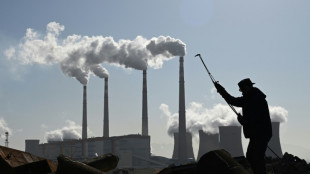
-
 Top Russian official in Washington for talks on improving ties
Top Russian official in Washington for talks on improving ties
-
Sinner's former physio to blame for failed dope tests, says ex-physical trainer

-
 Germany slams Trump tariffs, US tech titans in crosshairs
Germany slams Trump tariffs, US tech titans in crosshairs
-
Trump tariff blitz sparks retaliation threats, economic fears
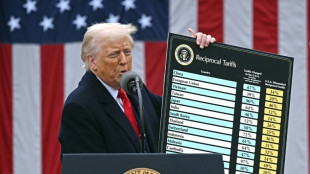
-
 Search for Malaysia's long missing MH370 suspended
Search for Malaysia's long missing MH370 suspended
-
Hungary announces ICC withdrawal as Israel's Netanyahu visits

-
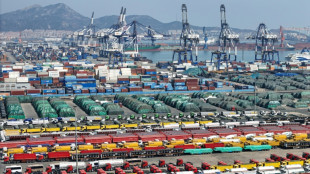 Trump's tariffs sting Asian giants, including US allies
Trump's tariffs sting Asian giants, including US allies
-
India says 'examining the implications' of US tariffs
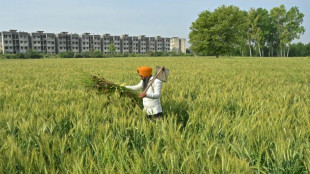
-
 Evenepoel set to make injury return at Tour de Romandie
Evenepoel set to make injury return at Tour de Romandie
-
USA sole bidder for 2031 Women's World Cup, UK set to host in 2035 - Infantino

-
 McLaren's Norris says it's 'our turn' for success
McLaren's Norris says it's 'our turn' for success
-
Lessons and liquids: buried alive in Myanmar's earthquake

-
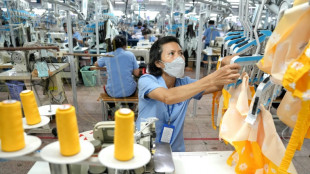 Trump tariffs spark fears for Asian jobs, exporting sectors
Trump tariffs spark fears for Asian jobs, exporting sectors
-
Stocks and dollar sink, havens rally as Trump tariffs fan trade war
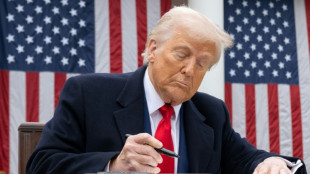
-
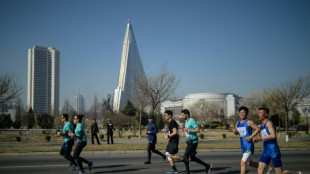 Runners fly to North Korea for first post-Covid Pyongyang Marathon
Runners fly to North Korea for first post-Covid Pyongyang Marathon
-
Hamilton rubbishes claims he's lost faith in Ferrari

-
 Nintendo Switch 2 sparks excitement despite high price
Nintendo Switch 2 sparks excitement despite high price
-
Sri Lanka's crackdown on dogs for India PM's visit sparks protest
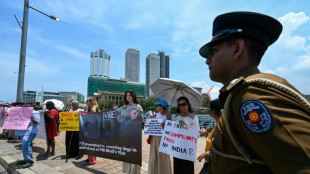
-
 S Korea police raise security levels ahead of impeachment verdict
S Korea police raise security levels ahead of impeachment verdict
-
China vows 'countermeasures' to sweeping new US tariffs

-
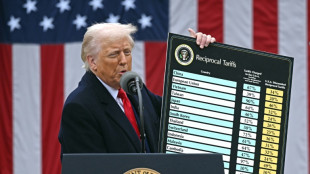 Trump jolts allies, foes and markets with tariff blitz
Trump jolts allies, foes and markets with tariff blitz
-
France says EU to target US online services after Trump tariffs

-
 Tsunoda vows to bring 'something different' after Red Bull promotion
Tsunoda vows to bring 'something different' after Red Bull promotion
-
Verstappen not happy with Tsunoda-Lawson Red Bull swap

-
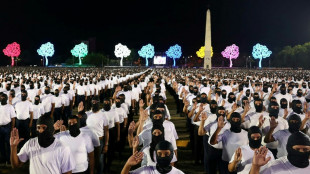 Experts accuse 54 top Nicaragua officials of grave abuses
Experts accuse 54 top Nicaragua officials of grave abuses
-
Remains of 30th victim of Los Angeles fires found
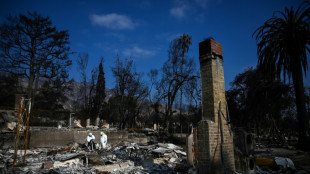
-
 EU to target US online services after Trump tariffs: France
EU to target US online services after Trump tariffs: France
-
How Trump's 'liberation day' tariffs will impact China
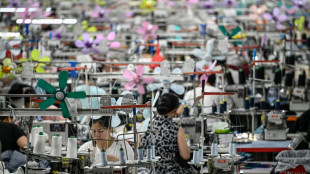
-
 Malaysia suspends search for long-missing flight MH370
Malaysia suspends search for long-missing flight MH370
-
Search for long-missing flight MH370 suspended: Malaysia minister

-
 Europe hits out at Trump tariffs, keeps door open for talks
Europe hits out at Trump tariffs, keeps door open for talks
-
Myanmar's junta chief to head to Bangkok summit as quake toll surpasses 3,000
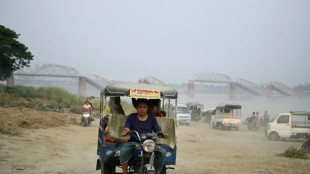
-
 Lawson vows to prove he belongs in F1 after shock of Red Bull axing
Lawson vows to prove he belongs in F1 after shock of Red Bull axing
-
Australia sweats through hottest 12 months on record: official data

-
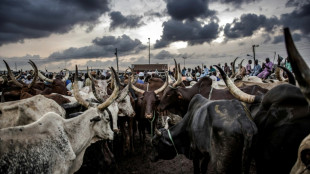 Livestock theft is central to jihadist economy in west Africa
Livestock theft is central to jihadist economy in west Africa
-
South African artist champions hyenas in 'eco-queer' quest

-
 Danish PM in 'unity' Greenland visit amid US takeover threats
Danish PM in 'unity' Greenland visit amid US takeover threats
-
Taiwan says US tariffs 'highly unreasonable'
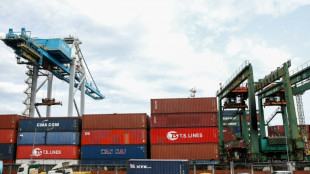
-
 Lawson says ruthless Red Bull axing was 'tough to hear'
Lawson says ruthless Red Bull axing was 'tough to hear'
-
Heat humble Celtics for sixth straight win, Thunder roll on

-
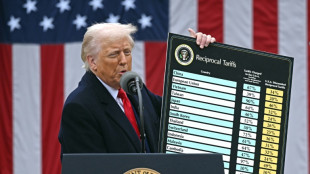 Trump escalates trade war with sweeping global tariffs
Trump escalates trade war with sweeping global tariffs
-
Japan says US tariffs 'extremely regrettable', may break WTO rules

-
 South Koreans anxious, angry as court to rule on impeached president
South Koreans anxious, angry as court to rule on impeached president
-
Juve at in-form Roma with Champions League in the balance

-
 Injuries put undermanned Bayern's title bid to the test
Injuries put undermanned Bayern's title bid to the test
-
Ovechkin scores 892nd goal -- three away from Gretzky's NHL record

-
 Australian former rugby star Petaia signs for NFL's Chargers
Australian former rugby star Petaia signs for NFL's Chargers
-
China says opposes new US tariffs, vows 'countermeasures'

-
 Athletics world watching as 'Grand Slam Track' prepares for launch
Athletics world watching as 'Grand Slam Track' prepares for launch
-
Heat humble Celtics for sixth straight win, Cavs top Knicks


The farm fires helping to fuel India's deadly air
Blazing flames light the sky as Indian farmer Ali Sher burns his fields to clear them for new crops, a common but illegal practice that is fuelling deadly pollution killing millions.
Burning strips the fertility of fields, has a ruinous impact on India's economy and sends plumes of acrid smoke packed with dangerous cancer-causing particles drifting over a densely-populated belt of northern India, including capital New Delhi's 30 million people.
But it is cheap -- for farmers at least -- to carry out.
Small-scale growers like Sher with less than two hectares (five acres) of land -- who make up 86 percent of Indian farms, according to the World Economic Forum -- say alternatives to burning simply do not allow them to make the profit they need to survive.
The 55-year-old farmer is just one of the many thousands who torch the stubble left after their rice harvest to prepare the fields to plant a winter crop of wheat.
"I am scared of the authorities finding out, but I can't help it," said Sher, from Haryana's Jind district, as black plumes rose from his fields some 115 kilometres (70 miles) from the capital.
He faces a hefty fine and loss of critical government farming subsidies if caught.
But he said that burning provided the only way to clear the land in time to ensure wheat seeds are planted in the narrow weather window.
"If I don't plant the wheat now, it will be too late," he said.
Several studies indicate that farm fires turn the air in Delhi -- a city already choked by too many polluting vehicles and regularly ranked as the worst capital city in the world for air quality –- even more lethal.
- Toxic smog -
Those fires form a key part of the toxic smog impacting the health of millions, which, along with vehicle and factory emissions, create choking air that surges to more than 50 times the World Health Organization recommended limit of hazardous PM2.5 pollutants.
A study in the Lancet medical journal attributed 1.67 million premature deaths in India to air pollution in 2019.
India's federal government has pumped in millions of dollars of subsidies to encourage modern machinery to stop the burning.
That includes baling machines that gather the straw into blocks, as well as combined ploughing and planting tools, which return the stubble back into the soil while sowing the next crop.
It makes economic sense on paper for the longterm, but the wider cost of burning is vast.
One study by global consultancy firm Dalberg estimates air pollution overall drives losses to the tune of $95 billion annually, or roughly three percent of the country's GDP.
Burning fields also "reduces water retention and soil fertility by 25 to 30 percent", according to the UN Environment Programme, thus requiring farmers to pay more in expensive fertilisers and irrigation systems.
But small-scale farmers say the numbers do not add up for them.
They cannot afford to buy the tractors needed, so they must rely on costly contractors to clear their fields.
Rice and wheat farmer Ajay Saini said that slices into his already limited profits.
"We spend money from our pockets in paying the contractor," he said, adding that the straw bales collected had tumbled in value too.
In a farming economy shifting from animal husbandry to tractors, straw bales once used for animal bedding and winter fodder are needed far less.
"A small farmer burns his field out of necessity," he said.
Saini said he waited for two weeks for a contractor to clear his land, but they focused on big farms, and he could not afford to delay planting.
"I called several times, but he just would not come to a small farm like mine," he said. "If the moisture in the field is all gone, how will the wheat grow?"
- 'Land will become barren' -
Some farmers are slowly shifting to better practices.
Farm fires have reduced by as much as half since 2017, according to some government estimates.
Naresh, a farmer in his 60s who uses only one name, said he had stopped burning his fields.
"It will only hurt us," he said. "The microorganisms in the soil die, and our land will become barren."
The switch was aided by the Spanish rice exporting company Ebro, which buys his rice.
In a bid to reduce its carbon footprint, Ebro supported several farmers in Naresh's village to form a cooperative, providing them with a free seeder machine.
Farmers had to promise not to set fire to their fields, and instead spray stubble with a natural fungal spray speeding up decomposition, developed by the Indian Agricultural Research Institute.
That also reduces the need for fertilisers as it "recycles nutrients back into the soil", said Ebro official Surendra Pal, working to ensure the company's rice meets tougher European standards.
But for now, many farmers say burning is the only real option.
"We know that it is bad for our fields," said farmer Balkar Singh, from Haryana's Panipat district. "We only do it because we have no other choice."
X.Karnes--AMWN

